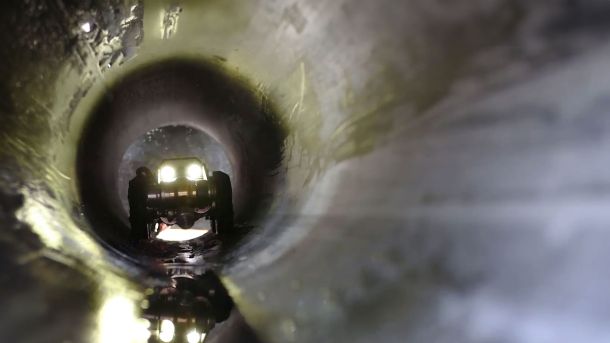Drain Blockage? Robotic Cutting From McBreen Enviro UK Can Help
McBreen Enviro UK offer robotic drain cutting services that can provide substantial cost savings for your business. This is particularly true in cases where expensive excavation is the only alternative. Our state-of-the-art equipment excels at precisely removing obstructions.
Robotic cutting use specialized equipment to clear blockages in pipes and drains. Obstructions in pipelines can cause unnecessary damage, expense and inconvenience. If not dealt with, obstructions can cause blockages which in turn can result in further damage and restrict the efficiency of your drainage network.
How Robotic Cutting works
Here’s how it typically works:
1. Inspection
Firstly, a small robotic camera is inserted into the drain to assess the blockage. It captures real-time video footage, which helps our technicians identify the issue.
2. Navigation
Our operator remotely controls the robot. Alternatively it can follow a pre-programmed path. It moves through the pipes, navigating bends and obstacles.
3. Clearing Blockages
Depending on the situation, the robot can use various tools:
- Cutters: A rotating blade or cutter will be attached to the robotic equipment and sent back to the blockage. This effectively breaks down solid debris within the drain. As the robot moves through the pipe, these blades rotate and slice through obstructions like tree roots, grease build-up, or other solid materials. Precise cutting minimizes damage to the pipe while efficiently removing blockages.
- High-Pressure Water Jets: These jets emit highly-pressurized water streams to dislodge clogs and blockages. The extreme force of the water dislodges clogs, flushing them away, effective against grease, sediment, and soft blockages. Find out more about how McBreen Enviro UK can offer High-Pressure Water Cutting here.
The choice of method depends on the specific blockage type and the condition of the drain.
4. Feedback
The camera provides continuous feedback to the operator, ensuring precise manoeuvring and effective blockage removal.
5. Completion
With the blockage cleared, the robot is retrieved. Afterwards the drain is inspected to confirm a successful clearance.
Typical Scenarios for Cutting
Robotic Cutting can handle various types of blockages, ensuring efficient clearance without costly excavation. Here are some common scenarios where our robotic cutters excel:
- Removing Tree Roots: Root ingress is a frequent issue that damages drains and causes blockages. Robotic cutters will effectively remove tree roots while preventing the need for manual digging.
- Clearing Building Materials: Construction debris like tile slurry, cement, and concrete often enters drains. Our cutters grind out materials into manageable pieces, which can then be removed.
- Opening Lateral Connections: When rehabilitating a defective drain using cured-in-place pipe (CIPP) technology, lateral connections (branch pipes connecting properties to the main sewer) need to be opened. Using robotic cutters will ensure connections are precisely cut after the liner has cured inside the pipe.
- Removing Foreign Objects: Robotic cutters will handle many types of obstruction. These can include old cables, wooden fence posts, metals, foundation spikes, and other debris.
In summary, these advanced robots navigate complex pipe networks, ensuring precise and efficient blockage removal. Robotic cutting will minimize excavation, reduce costs, and improve efficiency!
If you have a blockage that needs inspecting then we are here to assist you. Connect with our team today by calling 01905 959013 or you can email us at sales@mcbreenenviro.co.uk



